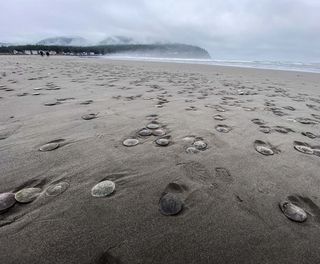By Rachael Rettner
Experts don't know why so many sand dollars showed up on a beach in Northern Oregon.

Thousands of sand dollars washed ashore at Seaside Beach, Oregon, on Aug. 15, 2021. (Image credit: Tiffany Boothe/Seaside Aquarium)
Thousands of sand dollars mysteriously washed ashore in Oregon in a "mass die-off" event, according to news reports.
Last week, the circular sea creatures showed up in droves on Seaside Beach in northern Oregon, according to a Facebook post from Seaside Aquarium.
"At this time, we do not know what has caused this, and these types of incidents usually have several contributing factors," aquarium representatives wrote. "It is hard to convey how many sand dollars [are] washing in."
Related: 10 strange animals that washed ashore in 2020
The sand dollars were alive when they washed in during high tides and became stranded, but they "are unable to make it back to the water once the tide recedes," aquarium representatives said. "This is resulting in them drying up and dying."
RELATED CONTENT
—Majestic 100-pound moonfish washes up on Oregon beach
—Mass stranding event beaches 450 whales in Tasmania
—13 bizarre things that washed up on beaches
Sand dollars are species of sea urchins that live on the sandy seafloor, typically close to shore, according to the Monterey Bay Aquarium. Beachgoers are likely familiar with the white exoskeleton of the dead sand dollar. But living sand dollars are covered with tiny gray or purple spines that make the animals look fuzzy, Seaside Aquarium said. Once sand dollars wash ashore, they can survive only a few minutes, according to The Oregonian.
Sand dollars often live packed together on the seafloor, with more than 600 inhabiting 1 square yard (0.8 square meters), according to the Monterey Bay Aquarium.
The reason for the mass die-off in Oregon is still unknown, but the phenomena may be related to currents unearthing the sand dollars and bringing them ashore, according to local news outlet Oregon Coast Beach Connection
Originally published on Live Science.
Thousands of sand dollars mysteriously washed ashore in Oregon in a "mass die-off" event, according to news reports.
Last week, the circular sea creatures showed up in droves on Seaside Beach in northern Oregon, according to a Facebook post from Seaside Aquarium.
"At this time, we do not know what has caused this, and these types of incidents usually have several contributing factors," aquarium representatives wrote. "It is hard to convey how many sand dollars [are] washing in."
Related: 10 strange animals that washed ashore in 2020
The sand dollars were alive when they washed in during high tides and became stranded, but they "are unable to make it back to the water once the tide recedes," aquarium representatives said. "This is resulting in them drying up and dying."
RELATED CONTENT
—Majestic 100-pound moonfish washes up on Oregon beach
—Mass stranding event beaches 450 whales in Tasmania
—13 bizarre things that washed up on beaches
Sand dollars are species of sea urchins that live on the sandy seafloor, typically close to shore, according to the Monterey Bay Aquarium. Beachgoers are likely familiar with the white exoskeleton of the dead sand dollar. But living sand dollars are covered with tiny gray or purple spines that make the animals look fuzzy, Seaside Aquarium said. Once sand dollars wash ashore, they can survive only a few minutes, according to The Oregonian.
Sand dollars often live packed together on the seafloor, with more than 600 inhabiting 1 square yard (0.8 square meters), according to the Monterey Bay Aquarium.
The reason for the mass die-off in Oregon is still unknown, but the phenomena may be related to currents unearthing the sand dollars and bringing them ashore, according to local news outlet Oregon Coast Beach Connection
Originally published on Live Science.
No comments:
Post a Comment